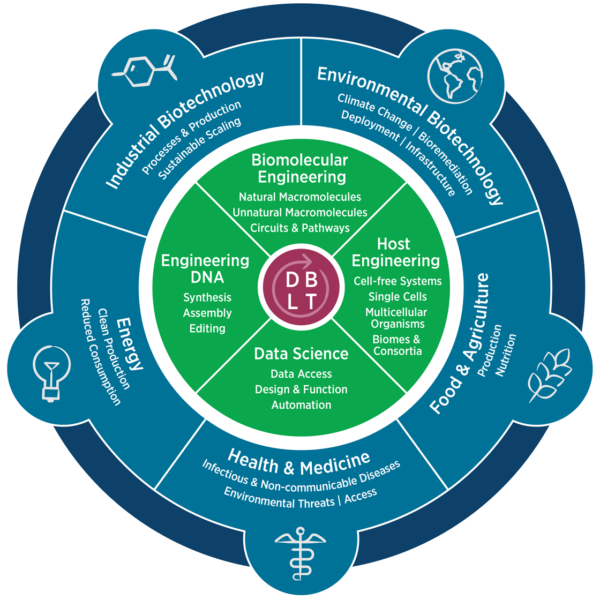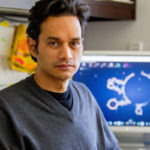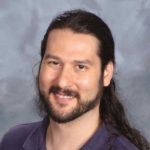Engineering Biology

Engineering Biology
Engineering Biology: A Research Roadmap for the Next-Generation Bioeconomy is a critical assessment of the current status and potential of engineering biology. It is intended to provide researchers and other stakeholders (including government funders) with a compelling set of technical challenges and opportunities in the near and long term. The matrixed framework of the roadmap considers challenges, bottlenecks, and other limitations observed or predicted in the research, development, and application of advancements in engineering biology tools and technologies toward addressing broad societal challenges. The roadmap’s four technical themes form the foundation of engineering biology research and technology and illustrate where our current abilities lie and what we might achieve in the next 20 years. Complementarily, the five roadmap application and impact sectors demonstrate the breadth and impact of technical advancements in real-world application areas and exemplify how engineering biology tools and products could be oriented towards some of the most complex problems we face as a society. The technical themes represent a “bottom-up” approach focusing on tool and technology innovations to move the field forward, while the five application and impact sectors are a “top-down” look at how engineering biology could contribute toward addressing and overcoming national and global challenges.
More about Engineering Biology
Technical Themes
The technical themes of the roadmap focus on four key areas of engineering biology research and development. Each technical theme has a series of transformative tools and technologies and aspirational goals that drive the progression of research and development. The roadmap consists of overarching breakthrough capabilities that convey significant advancements in the field and 2-, 5-, 10-, and 20-year milestones.
-
Engineering DNA
Gene Editing, Synthesis, and Assembly focuses on the development and advancement of tools to enable the production of chromosomal DNA and the engineering of entire genomes.
-
Biomolecular Engineering
Biomolecule, Pathway, and Circuit Engineering focuses on the engineering of functional macromolecules, design of complex circuits and pathways, and regulatory system dynamics.
-
Host Engineering
Host and Consortia Engineering focuses on the advancements required for the engineering of cell-free systems, host cells, and organisms, and the integration and interaction of these systems and the environment.
-
Data Science
Data Integration, Modeling, and Automation focuses on robust, systematic use of the design, build, test, learn methodology to create complex systems.
Applications & Impact Sectors
The roadmap illustrates many potential applications of engineering biology, and demonstrates the possible use and impact of these tools and technologies to address and overcome societal challenges. We frame these possibilities through a focus on five sectors, by identifying science and engineering aims and objectives for engineering biology that may be necessary or instrumental to overcoming the challenge, and potential discrete technical achievements towards the objectives. These technical achievements in each sector reflect our four technical themes.
Print Engineering Biology
Download a printable PDF.
(Then view it on your iPad and save a tree.)
Roadmap PDF →
Contributors
-
Jason Aulds
US Department of Defense
-
Ania-Ariadna Baetica
University of California, San Francisco
-
Cassandra Barrett
Arizona State University
-
Allison Berke
The Good Food Institute
-
Daniel Brauer
University of California, Berkeley
-
Kathryn Brink
Rice University
-
James Chappell
Rice University
-
Yvonne Chen
University of California, Los Angeles
-
George Church
Harvard Medical School
-
Austin Cole
University of Texas
-
Rhiju Das
Stanford University
-
Jason Delborne
North Carolina State University
-
Doug Densmore
Boston University
-
James Diggans
Twist Bioscience Corporation
-
John Dueber
University of California, Berkeley
-
Mary Dunlop
Boston University
-
Christopher Earnhart
US Department of Defense
-
Robert Egbert
Pacific Northwest National Laboratory
-
Andrew Ellington
University of Texas at Austin
-
Steven Evans
Dow AgroSciences
-
Mike Fero
TeselaGen Biotechnology, Inc.
-
J.L. Clem Fortman
Engineering Biology Research Consortium
-
Emma Frow
Arizona State University
-
Larry Gilbertson
Monsanto
-
Jimmy Gollihar
US Army Research Laboratory
-
Alexander Green
Arizona State University
-
Tahlia Haeuser
Zymergen
-
Emily Hartman
University of California, Berkeley
-
Nathan Hillson
Lawrence Berkeley National Lab
-
Cyan James
Peraton, support to US Dept. of Defense
-
Richard Johnson
Global Helix LLC
-
Terry Johnson
University of California, Berkeley
-
Kristala Jones Prather
Massachusetts Institute of Technology
-
Richard Kitney
Imperial College London
-
Cody Krivacic
University of California, San Francisco
-
Natalie Kuldell
BioBuilder Educational Foundation
-
Joshua Leonard
Northwestern University
-
Julius Lucks
Northwestern University
-
June Medford
Colorado State University
-
Jeremy Mills
Arizona State University
-
Richard Murray
California Institute of Technology
-
Vincent Noireaux
University of Minnesota
-
Michael P. O’Keefe
LMI, support to US Dept. of Defense
-
Ken Oye
Massachusetts Institute of Technology
-
Megan Palmer
Stanford University
-
C. Nicole Rosenzweig
US Department of Defense
-
Heike Sederoff
North Carolina State University
-
Patrick Shih
University of California Davis
-
Michael Smanski
University of Minnesota
-
Liz Specht
The Good Food Institute
-
Ranjan Srivastava
University of Connecticut
-
Mark Styczynski
Georgia Institute of Technology
-
Kersh Theva
University of California, Berkeley
-
Kurt Thorn
Zymergen
-
Danielle Tullman-Ercek
Northwestern University
-
Alon Wellner
University of Caifornia, Irvine
-
Wilson Wong
Boston University
-
Peng Yin
Harvard Medical School
-
Jesse Zalatan
University of Washington
-
Alex Zanghellini
Arzeda
-
Jeremy Zucker
Pacific Northwest National Laboratory


























































